October 25, 2022 - No. 34
Opposition to Oath of Allegiance to Charles III
Parti
Québécois MNAs Take Oath of Allegiance to People
of Quebec Only
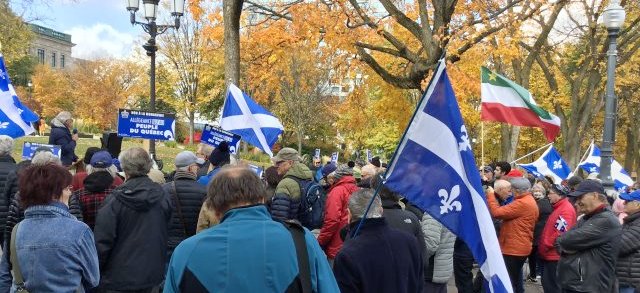 Rally outside Quebec national
assembly in support of refusal of PQ MNAs to take oath of allegiance to
Rally outside Quebec national
assembly in support of refusal of PQ MNAs to take oath of allegiance to
King Charles III, October 21, 2022.
• Oath of Allegiance Raised in House of Commons
For Your Information
• Parti Québécois Leader Speaks About Significance of Oath of Office
• Open Letter Argues Why
Oath of Allegiance to King of
England Is Unconstitutional
Opposition to Oath of Allegiance to Charles III
Parti Québécois MNAs Take Oath of Allegiance to People of Quebec Only
On October 21, the three Parti Québécois members elected to the Quebec National Assembly -- Paul St-Pierre Plamondon leader of the Parti Québécois (Camille Laurin), Pascal Bérubé (Matane-Matapédia) and Joël Arseneau (Îles-de-la-Madeleine) -- took the oath of allegiance to the people of Quebec, but not King Charles III, in the National Assembly's Red Room.
 On
Monday, October 17, Paul St-Pierre Plamondon had invited the MNAs of
all parties not to swear allegiance to King Charles III, saying that
one cannot have two masters when they represent conflicting interests.
On Tuesday, the 90 members of the Coalition Avenir Québec
(CAQ)
took the oath of
allegiance to the people of Quebec and the King of England. They were
followed on Wednesday by the 21 MNAs of the Quebec Liberal Party (PLQ)
who did the same. On the same day, the 11 MNAs of Québec
solidaire (QS) took a single oath to the people of Quebec.
On
Monday, October 17, Paul St-Pierre Plamondon had invited the MNAs of
all parties not to swear allegiance to King Charles III, saying that
one cannot have two masters when they represent conflicting interests.
On Tuesday, the 90 members of the Coalition Avenir Québec
(CAQ)
took the oath of
allegiance to the people of Quebec and the King of England. They were
followed on Wednesday by the 21 MNAs of the Quebec Liberal Party (PLQ)
who did the same. On the same day, the 11 MNAs of Québec
solidaire (QS) took a single oath to the people of Quebec.
Both Premier Legault and the PLQ say that they don't like swearing allegiance to the King but that it is not a priority to change the requirement at this time and that they would do so at the right opportunity. They do not say what that opportunity would be.
In the same week, Premier François Legault decided to postpone the start of the National Assembly by two weeks, from Tuesday, November 15 to Tuesday, November 29.
PQ leader Paul St-Pierre Plamondon held a press conference following the swearing in of his party's three MNAs. He explained the significance of their oath of allegiance to the people of Quebec alone, recalling that in all of Quebec's history since Confederation, there has never been consent to take the oath to the monarchy. "Without arms, without violence and without conquest, there would be no king or oath in Quebec," he said.
 At
the same time as the swearing-in ceremony of the PQ MNAs, some 100
people gathered in front of the National Assembly in support of their
action. The rally was organized by the Rassemblement pour un pays
souverain and activists carried signs reading "No to the monarchy,
allegiance only to the
people of Quebec." In support of the PQ MNAs, they recited an act of
abjuration, i.e., an oath taken to renounce or repudiate something or
someone:
At
the same time as the swearing-in ceremony of the PQ MNAs, some 100
people gathered in front of the National Assembly in support of their
action. The rally was organized by the Rassemblement pour un pays
souverain and activists carried signs reading "No to the monarchy,
allegiance only to the
people of Quebec." In support of the PQ MNAs, they recited an act of
abjuration, i.e., an oath taken to renounce or repudiate something or
someone:
"I, ... deny all allegiance, all submission to Charles III, declared King of Canada. To him, his heirs, successors and representatives, I recognize no sovereignty over Quebec."
They then recited this act of allegiance, "I, ..., swear that I will be loyal to the Quebec nation, to its language, to its culture and that I will faithfully serve the Republic of Quebec in friendship with the native peoples." Several people spoke in support of this gesture. The PQ leader came out to greet them after the ceremony.
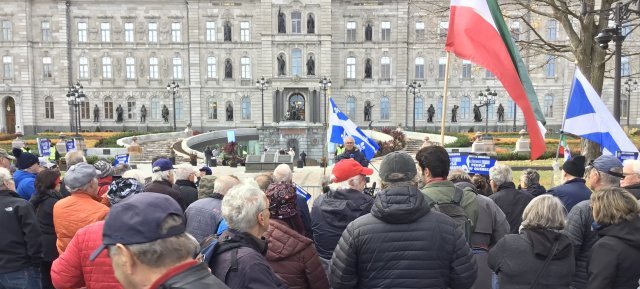
(Translated from original French by TML. Photos: Rassemblement pour un pays souverain, R. Ricard)
Oath of Allegiance Raised in House of Commons
On October 20, the issue of the oath of allegiance to Charles III as a prerequisite to sitting in the House of Commons was raised in the House. Yves-François Blanchet, leader of the Bloc Québécois, said that as the debate was taking place in Quebec, he wanted to reopen the same debate in the federal Parliament.
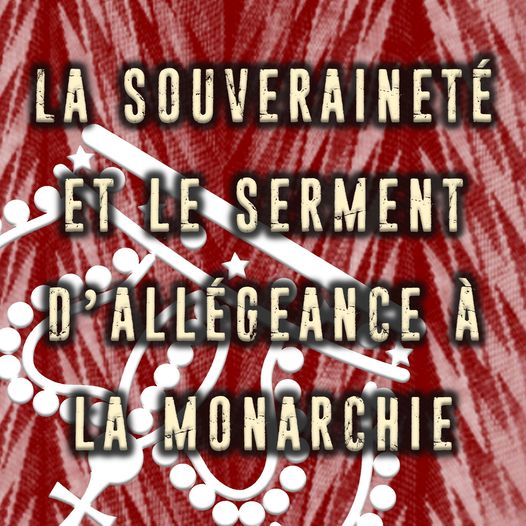 The
other parties in the House of Commons were quick to say that Canadians
are concerned about inflation and the rising cost of living. Canada's
relationship with the British monarchy is not a priority, they said.
Party leaders, except for the Bloc Québécois,
said they
do not intend to change the
oath of allegiance to the British monarch for Members of Parliament.
The
other parties in the House of Commons were quick to say that Canadians
are concerned about inflation and the rising cost of living. Canada's
relationship with the British monarchy is not a priority, they said.
Party leaders, except for the Bloc Québécois,
said they
do not intend to change the
oath of allegiance to the British monarch for Members of Parliament.
Prime Minister Justin Trudeau said, "There is no intention here in the House of Commons to change the oaths of office." Pablo Rodriguez, Minister of Canadian Heritage, said, "Canada is a country where there is rule of law, that is the rule. So I'm comfortable with that." He did not attempt to clarify the content of that rule of law. David Lametti, Minister of Justice and Attorney General of Canada,said, "The oath is enshrined in our Constitution and is an ancient tradition of our parliamentary system. It is first and foremost an oath to our institutions and our democracy, of which the Sovereign is a part. Canadian courts have made it clear that it is not an oath to the individual, now King Charles III, but to the state he represents." He also had nothing to say about that democracy which begs the question of what the oath means. Trudeau later added, despite all evidence to the contrary, "What I can tell you is that there is not one Quebecker who wants the Constitution reopened."
On the question of whether Quebec has the right to change the oath of allegiance required to sit in the National Assembly under the Constitution Act, 1867, Trudeau said, "I don't want to speculate on what the National Assembly can or cannot do. These swearings are governed by the Assembly and Parliament itself. The National Assembly has the right to decide how they want to organize their swearing-in process. It takes a bill, but for that, it takes MNAs who sit, who vote."
The Bloc Québécois announced it would use its opposition day in the Commons on Tuesday, October 25, to introduce a motion calling on the House "to debate and consider ending Canada's relationship with the British monarchy."
For Your Information
Parti Québécois Leader Speaks About
Significance of Oath of
Office
On October 21, after swearing loyalty to the people of Quebec but refusing the oath of loyalty to King Charles III, Parti Québécois leader Paul St-Pierre Plamondon addressed a press conference at which, amongst other things, he elaborated his views on what it means to swear an oath of allegiance.
"We are now in an era where consent is at the heart of many social debates, and rightly so," Plamondon stressed. Here is an excerpt of what he said:
|
"I am very happy and very touched to see so many of you here together to celebrate our sincere oath to the people of Quebec. For an oath reveals a real meaning, gives meaning to our political commitment. Who would want to live in a world where nothing has meaning? Neither the word given, nor the flag raised, nor the symbols displayed, nor the past of one's own grandparents, nor the future of one's own grandchildren, a world where everything is relative, vague and unimportant. A world where promises can be broken, where convictions are soft, interchangeable and change according to the prevailing wind of the situation, fashion or ambitions. A world where it would be normal to say the opposite of what one thinks and to think the opposite of what one says.
"The Parti Québécois has a long tradition of public service, of serving the interests of Quebeckers. And as the 10th leader of this party, I wish to continue and further this political heritage. We are on the side of those who say that words have meaning. That when we give our word, make a commitment, sign a document or vote on a law, we commit our honour, we become responsible in the strongest sense of the word. Since the dawn of time, humans have imagined words that are stronger than all others, a solemn commitment, an oath. 'To pronounce an oath is to put your soul in danger,' said the writer Ken Follet.
"Unfortunately, for several decades, in Quebec we live in a straitjacket that condemns each elected representative of the Quebec people to hypocrisy. A straitjacket that forces democrats of all parties to take an oath they do not believe in and thus perjure themselves, to sully the very value of their words, and to do so in the first act they are called upon to perform as representatives of the citizens. The founding leader of the Parti Québécois, René Lévesque, took Quebec part of the way by inserting into the Act of the National Assembly another oath, the oath to the people of Quebec that you have just heard. And in doing so, he allowed all elected officials to take at least one sincere oath, but without exempting them from taking another one that must be characterized by the right word: false. And here I do not blame anyone. It is only in recent years that there are jurists who have awakened to the hypothesis that it would be possible to get out of this straitjacket by simply ignoring the oath made to the British Crown. One cannot serve two masters. The coexistence of the two oaths, the true and the false, has always been untenable; it is now indefensible.
"We are therefore finally at the time of decision. And as such, let us ask ourselves a simple question. When did Quebeckers, directly or indirectly through their elected representatives, consent to the existence of this oath to the King of England? When did Quebeckers even consent to a foreign royal family, the one that hanged the patriots, the one that deported the Acadians and the one that confirmed the unilateral patriation of the Canadian Constitution without Quebec's consent, when did we consent to a foreign royal family being chosen to formally lead the Canadian and Quebec states?
"We are now in an era where consent is at the heart of many social debates and rightly so. So when did we say yes to the Queen and King, to this oath, to this exercise in humiliation and reminder of colonial domination? Certainly not in 1982 when the Canadian Constitution was adopted, renewing this act of submission without the agreement of Quebec, because at the time, the members of the government and the official opposition rejected this constitution, and therefore rejected these provisions of the king and the oath. So as we often say in this assembly, no consent. Not even 10 years later in 1992, when Quebeckers themselves, personally, said by 57 per cent that the improved version of this constitution would not be acceptable. So again, no consent.
"Would we have consented in 1867, when this constitution was written? None of Quebec's elected officials had a mandate to approve this text because its existence had not been mentioned at all in previous elections. It was at the center of the election of 1867, which is the most fraudulent in our history. We know that at the time, a majority of Quebeckers were opposed to the constitutional text and to Quebec's entry into Confederation. And again, no consent.
"We never said yes to the king and to this oath. And in fact, the legitimacy of King Charles III in Quebec, like that of all his predecessors, rests on one thing only: arms. The conquest, and the violence that came with it. And on the continuity that we, as Quebeckers, have been willing to give to all this, through our own passivity. Without arms, without violence and without conquest, there would be no king or oath in Quebec. Throughout the centuries, it is in the name of colonialism and British imperial domination that our elected representatives in Quebec have been forced to perjure themselves, and I think it is time to put an end to a past we never chose.
"To give meaning to the oath and to the ceremony we have today, we must henceforth take only one oath, the one to the people of Quebec, the one that speaks to the totality or the immense majority of the people we represent, and this is why I am reaching out to the other 122 democratically elected members of the National Assembly. Let us be the change we want to see in the world. Let us live up to the trust that the people of Quebec have placed in us by electing us, let us live up to history and the future.
"This brings me back to the election we have just lived through and to what will happen next. On October 3, more than 600,000 of you who are listening to us put your trust in us. More than 600,000 of you said that Quebec needed independentist members in the National Assembly, that you gave us the mandate to fight for fundamental issues, such as the future of French, the future of climate change, issues that are important to us. And so I would like to thank you again from the bottom of my heart, all of you who are listening to us from all over Quebec. We will strive to fulfill our mandate with all the pride, all the honesty and all the enthusiasm that we can muster. Although there are fewer of us than I would have liked, we must keep an eye on the big picture, remembering that we are certainly three elected officials, but we are also more than 2,000,000 Quebeckers who want Quebec to become a country. Our job over the next four years will be to increase that number and we will work on it every day."
(Translated from original French by TML. Photo: Paul St-Pierre Plamondon facebook.)
The Truth of the Matter
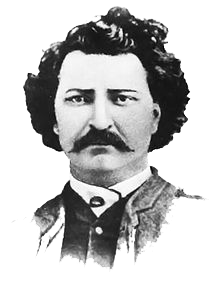
"When the Government of Canada presented itself at our doors it found us at peace. It found that the Métis people of the North-West could not only live well without it ... but that it had a government of its own, free, peaceful, well-functioning, contributing to the work of civilization in a way that the Company from England could never have done without thousands of soldiers. It was a government with an organized constitution whose jurisdiction was more legitimate and worthy of respect, because it was exercised over a country that belonged to it."
Open Letter Argues Why Oath of Allegiance to King of England Is Unconstitutional
On October 22, the Journal de Montréal published an open letter from the National Council of the Quebec Laicity Movement which gives the views of those who espouse the modern democratic principle that taking an oath to the King of England is a matter of conscience as well as unconstitutional because the Quebec state must not be religious in any way. For the information of our readers, we are publishing the text below, translated from the original French by TML.
Oath to the King of England Is Unconstitutional
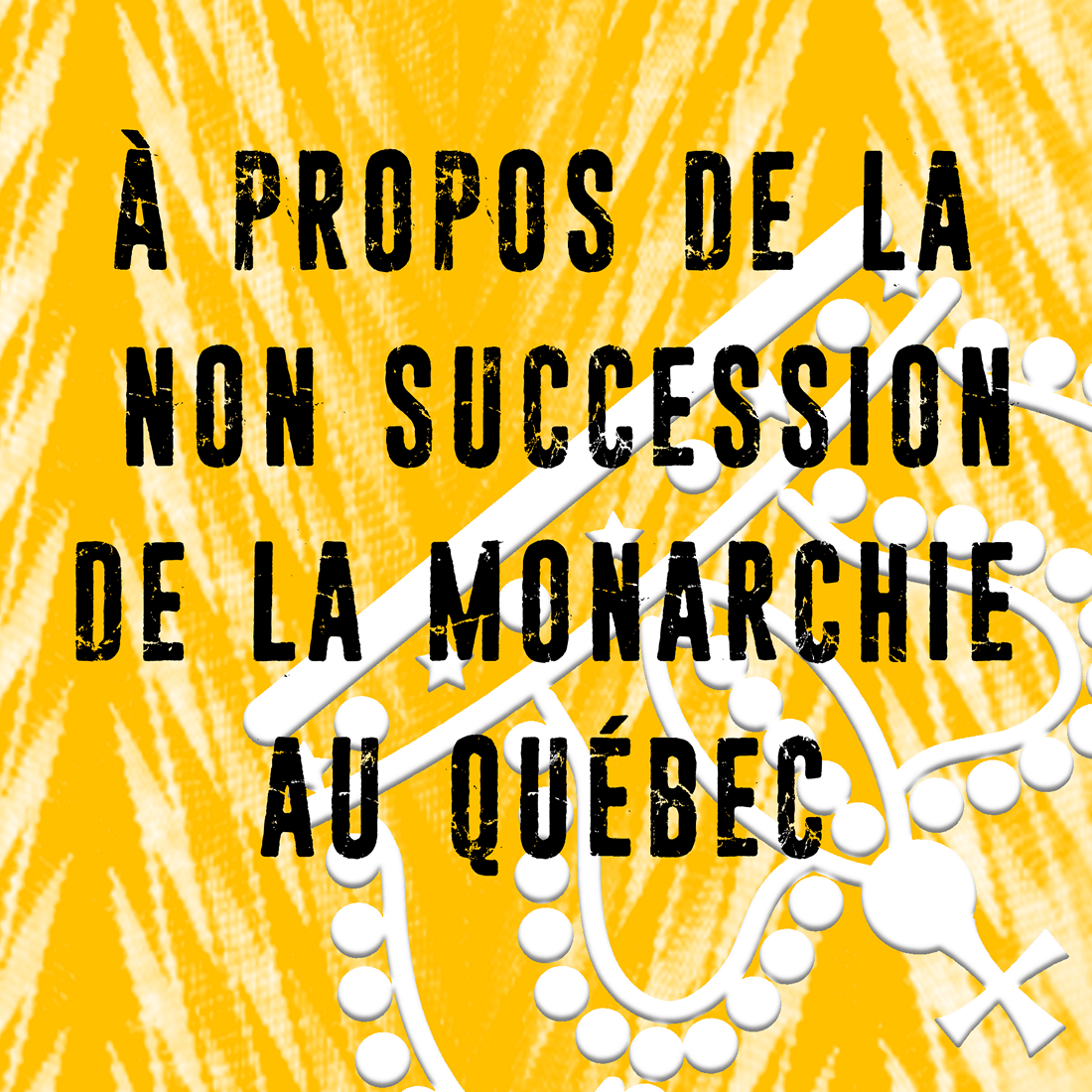 Inherited
from the Conquest and British colonialism which followed, the "oath of
allegiance to His Majesty" that MNAs must swear to is contrary to
Quebec's charter of rights and freedoms as well as the Canadian
Constitution of 1982.
Inherited
from the Conquest and British colonialism which followed, the "oath of
allegiance to His Majesty" that MNAs must swear to is contrary to
Quebec's charter of rights and freedoms as well as the Canadian
Constitution of 1982.
In the name of the principle of equality of all before the law, these two fundamental laws prohibit any discrimination, and therefore any privilege, exercised or granted on the basis of religious affiliation.
King Charles III, like his predecessors, holds the official religious title of "Defender of the Faith and Supreme Governor of the Church of England." This title dates back to King Henry VIII and notably bestows on him the privilege of appointing bishops, including of Canterbury, the primate of the Anglican Church. According to the affirmation engraved on Canadian coinage, the monarch is also said to be "king by the grace of God" (dei gratia regina or dei gratia rex).
By entrusting the office of head of state to a monarch who exercises religious functions and who is necessarily Anglican under British laws foreign to us, Canadian legislation governing the monarchy derogates from the principle of equality of all citizens contained in our charters.
The British-Canadian king thus enjoys privileges based on his national origin, blood relationship and religion, privileges which are prohibited for Canadian citizens. The appointment of such a head of state clearly violates the principle of equality of all and constitutes an unacceptable intrusion of religion in the running of the state.
Anti-Laicity Royalist Oath
The swearing of the oath by MNAs to such a king is part of the same institutional violation of our fundamental rights, which are republican in nature. Moreover, Quebec's Charter of Rights and Freedoms and our law on laicity affirm the laic character of the Quebec state. That representatives of a laic state are subject to a religious monarch whose only legitimacy is that conferred by a god is highly revealing of the contradictory and obsolete nature of the Canadian monarchy.
We therefore believe that the elected members of the Quebec National Assembly are not required to submit to this false, archaic, colonialist and illegitimate oath, which perpetuates the supremacy of a foreign monarch. In the name of the values of equality, laicity and the sovereignty of the people, this oath must be abrogated as soon as possible, along with the monarchy to which it is linked.
The argument that there are more urgent things to settle is inadmissible. This issue has resurfaced during every election over the past 40 years, and a simple motion to suspend the requirement of the royalist oath, pending its repeal, would take parliamentarians no more than 10 minutes.
By doing nothing in the name of this false claim, elected members are not only maintaining an illegitimate practice, but are also sending the message that an oath has no value and is even a gross lie.
Marilou Alarie, Joseph Aussedat, Daniel Baril, Yoland Bergeron, Micheline Boucher Granger, Philippe Dujardin, Lucie Jobin, Yvan Lamonde, Éric Ouellet, Noëlle Tannou for the National Council of the Quebec Laicity Movement
(To access articles individually click on the black headline.)
Website: www.cpcml.ca Email: editor@cpcml.ca


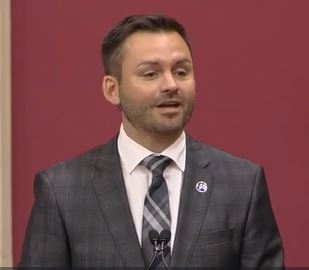 Parti
Québécois leader Paul St-Pierre Plamondon
addresses press conference, October 21, 2022.
Parti
Québécois leader Paul St-Pierre Plamondon
addresses press conference, October 21, 2022.